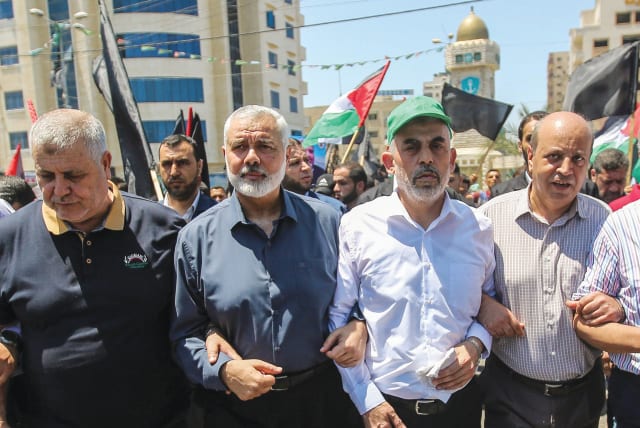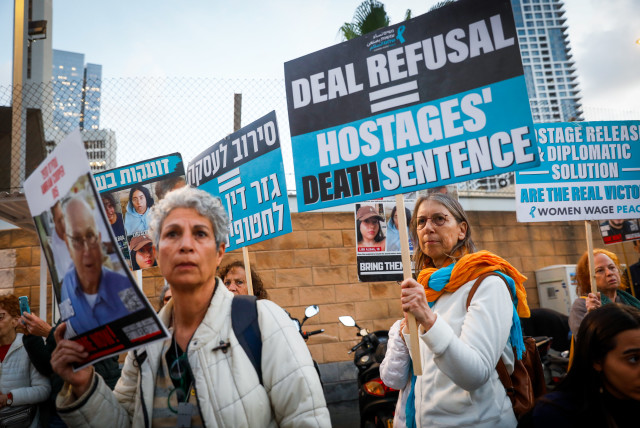Hamas leaves Cairo without deal, talks to resume next week

Senior Hamas official Sami Abu Zuhri said Israel had been "thwarting" efforts to conclude a ceasefire deal.
Hostage talks are expected to resume in Cairo next week, as Israel and Hamas remain deadlocked on the terms of a deal for a six-week pause to the Gaza war in exchange for the release of some 40 captives.
Hope for an agreement by the start of the holy month of Ramadan on Sunday night appeared slim on Thursday.
Negotiators still hoped, however, to finalize terms for a deal before the emotions of that sensitive period led to an explosion that could complicate the execution of a deal.
"Hamas's delegation left Cairo this morning for consultation with the leadership of the movement, with negotiations and efforts continuing to stop the aggression, return the displaced, and bring in relief aid to our people," a Hamas statement said.
Senior Hamas official Sami Abu Zuhri said Israel had been "thwarting" efforts to conclude a deal, which has been mediated by Egypt and Qatar with help from the United States.
Hamas officials have said a permanent ceasefire must be in place before the hostages are freed, Israeli forces must leave Gaza and all Gazans must be able to return to homes they have fled.
Hamas has said it can't provide a list of the hostages who are still alive without a ceasefire as the hostages are scattered across the war zone.
Israel has wanted to see a list of who would be included in the first deal out of the remaining 134 captives in Gaza. It has also asked to see the list of an expected 400 Palestinian security prisoners and terrorists that would be freed in exchange.
It has also insisted that it must be allowed to finish the IDF's military campagin to oust Hamas from Gaza.US officials blamed Hamas for the absence of a deal, even as they worked to put in place conditions on the ground in Gaza that would support an agreement by announcing plans to open a maritime route for goods to the enclave.
Hamas's demands
“The path to a ceasefire is straightforward. There could be at least a six-week ceasefire today if Hamas would agree to release a defined category of vulnerable hostages, including women, the elderly, the sick, and the wounded. That deal is on the table now and has been for more than the past week,” US officials told reporters in a background briefing.
“The onus right now is on Hamas,” the officials said.
US Ambassador to Israel Jack Lew spoke about the hostage deal at a conference by the Institute for National Strategic Studies (INSS) in Tel Aviv. It was important, he said, to focus on the fact that the talks were still ongoing.
“While the goal of having an agreement by Ramadan is important, I think getting it done when it gets done is what we have to focus on,” Lew said. While he acknowledged that every day it gets “more challenging,” he stressed that it is “a mistake to assume failure.”
It’s important to “remember why it's so urgent. First is their lives these people's lives matter,” he said of the hostage.
But it is also important to the domestic healing of the Israeli people and regional stabilization.
A pause to the Gaza war would increase the likelihood of a diplomatic solution to the cross-border violence between Israel and Hezbollah and provide an opportunity to pursue a Saudi normalization, Lew said.
“I think that there is a lot of pressure being brought to bear on all the parties in the negotiations to stay at it,” Lew said as he stressed that US President Joe Biden was “pressing leaders of other countries to stay engaged and not to let it become a failure.”
Jerusalem Post Store
`; document.getElementById("linkPremium").innerHTML = cont; var divWithLink = document.getElementById("premium-link"); if (divWithLink !== null && divWithLink !== 'undefined') { divWithLink.style.border = "solid 1px #cb0f3e"; divWithLink.style.textAlign = "center"; divWithLink.style.marginBottom = "15px"; divWithLink.style.marginTop = "15px"; divWithLink.style.width = "100%"; divWithLink.style.backgroundColor = "#122952"; divWithLink.style.color = "#ffffff"; divWithLink.style.lineHeight = "1.5"; } } (function (v, i) { });

